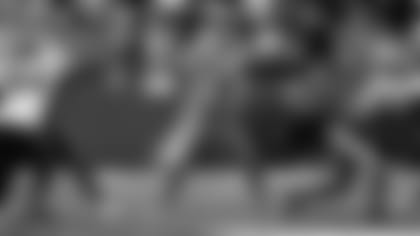Predictions and comparisons are good exercises with NFL teams on their summer break, which makes this a good time to compare how the 2019 Detroit Lions stack up against the franchise's last three playoff teams.
The three teams made it as wild cards – 10-6 in 2011, 11-5 in 2014, 9-7 in 2016.
Here is a look back at those three playoff teams, what their identity was, and any similarities between them and the 2019 Lions in Matt Patricia's second year as head coach:
2011
Identity: Drought busters.
The Lions hadn't made the playoffs since 1999, a year they and the Cowboys skidded in as wild cards with 8-8 won-loss records. And they'd been off Monday Night Football since Week 3 of 2001 – a 35-0 loss to the St. Louis Rams.
Preseason momentum: The Lions were crawling out of the Lost Decade when they didn't have a winning record from 2001-2010 and bottomed out in 2008 as the first team in NFL history to go 0-16.
Under third-year head coach Jim Schwartz, the Lions were 2-14 in 2009 and began to rebound at the end of 2010, winning their last four games to finish 6-10.
The question was whether they could carry it into the 2011 season.
Bottom line: The stars aligned as the Lions won their first five games to be the talk of the NFL.
Quarterback Matthew Stafford was healthy after missing 19 of 32 games in his first two seasons because of injuries. He threw for 5,038 yards and 41 TDs, both still his career highs.
The Game 5 win was a scintillating 24-13 explosion over the Chicago Bears on Monday Night Football. Ford Field's atmosphere was electric. The noise level was so high that the Bears' offensive linemen committed a flurry of false starts because they could not hear the quarterback's snap count.
Stafford started the scoring with a 73-yard TD pass in the first minute of the second quarter, but the breakout star was second-year running back Jahvid Best. He carried 12 times for 160 yards and clinched the win with an electrifying 88-yard TD run late in the third quarter.
The Lions stumbled at times the rest of the way but clinched a playoff berth with a 38-10 win over the Chargers at Ford Field on Christmas Eve.
Post playoffs: It was an exciting season, but the Lions were not a complete team, and it showed. They lost their running threat when Best went out with a career-ending concussion in Game 6 – one game after the win over Chicago.
The 2011 defense ranked 23rd for the season and deteriorated in the second half, allowing more than 400 yards in six of the last seven games. The Saints never punted in a 45-28 win in the wild card playoff game.
The 2011 Lions proved to be a one-year phenomenon. They were 4-12 and 7-9 in what proved to be the last two seasons for Schwartz as head coach.
2014
Identity: Coach change, culture change.
In a familiar bounce-back situation – losing records the previous two seasons -- Jim Caldwell was hired as head coach with a mandate to bring discipline on and off the field to a team that was sorely lacking in both. Caldwell did just that, with a group of players that quickly warmed to his approach.
There was a complete change in coaching leadership. In addition to Caldwell there were new coordinators on offense (Joe Lombardi) and defense (Teryl Austin).
Bottom line: Caldwell inherited a ready-made defense, with Ndamukong Suh, DeAndre Levy and Glover Quin in their prime and players such as cornerback Darius Slay on the rise. They played up to expectations, finishing the season ranked second overall and No. 1 against the run.
Lombardi was a first-year coordinator, and it showed at times.
Stafford was a veteran, durable quarterback at this point. He performed well, cutting interceptions from 19 in 2013 to 12 while making the Pro Bowl. Golden Tate was signed to be a complement to Calvin Johnson. Tate lived up to expectations with 99 catches and a Pro Bowl berth.
Bottom line: Caldwell gave the Lions what they wanted – a more disciplined team. It was reflected in their 11-5 won-loss record and wild card playoff berth. The Lions played well in a 24-20 road loss to the Cowboys.
With good veteran players and a top-tier quarterback, the Lions had the look of a team on the rise.
Post playoffs: The Lions were not a one-year wonder like the 2011 team, but they lacked staying power. Defensive losses were part of the reason. They lost Suh to Miami in free agency. Levy got injured and played only six more games in 2015-16 combined -- his final two seasons.
2016
Team identity: Comebacks.
The Lions made the playoffs as a wild card with a 9-7 won-loss record, but they lived on the edge all year. Eight of those victories were orchestrated by Stafford on fourth-quarter comebacks.
Franchise identity: Change at the top.
The Lions had a new general manager in Bob Quinn, who was brought in after two decades in the Patriots' personnel department to take the football team in a new direction.
Quinn's hiring was the result of a 2015 season that was marked by perhaps the most thorough upheaval in franchise history. After starting 0-5 and with a 1-7 record at the bye, Owner Martha Firestone Ford fired team president Tom Lewand and GM Martin Mayhew.
Previously, Lombardi was let go before a loss to Kansas City in Game 8 and replaced by Jim Bob Cooter.
Bottom line: The Lions had rallied the previous year to finish with a 7-9 record. Stafford's fourth-quarter heroics helped get the Lions to 9-4 with a chance to win the NFC North and have home-field advantage in the playoffs for the first time since 1991.
Unfortunately, Stafford sustained a finger injury in his throwing hand in a comeback win that got the Lions to 9-4. He wasn't the same the rest of the way. The Lions didn't win another game – three losses to end the regular season, and a 26-6 loss at Seattle in the playoffs.
Post playoffs: The Lions' inability to beat good teams continued in 2017. Although the Lions had a 9-7 record, there were too many games when they were not competitive. Despite three winning seasons, two playoff appearances and an overall record of 36-28 in the regular season, Caldwell was fired and replaced by long-time Patriots defensive coordinator Matt Patricia.
2019
Identity: Major change, building.
Quinn brought it to the front office in 2016, and Patricia has continued the overhaul as head coach.
The 2019 team has three new coordinators from the ones in place in 2017: Paul Pasqualoni on defense, Darrell Bevell on offense and John Bonamego on special teams. Pasqualoni was hired in 2018. Bevell and Bonamego were hired this year.
Those changes, and the roster turnover, reflect Patricia's hands-on coaching style with every facet of the team and every player, and his philosophy to field a tough team that can control the game with a minimum of mistakes.
Bottom line: Like the three playoff teams of 2011, 2014 and 2016, the 2019 Lions are following a season with a losing record.
Here are some similarities and differences, and how that can project to the 2019 season:
Offense: Stafford is a proven veteran and suddenly one of the team elders at the age of 31. His toughness and willingness to play through injuries has earned the respect of teammates, as has his golden arm.
He's also accustomed to working with a new coordinator. Bevell is No. 4 in seven years, following Scott Linehan, Lombardi and Cooter.
It's a different attack than what Stafford has run before. If there are any comparisons, the 2014 offense Lombardi tried to implement comes closest in terms of trying to control the game. The big difference is that Lombardi was a rookie coordinator. Bevell is an experienced coordinator, calling plays for the Vikings for five seasons (2006-10) and the Seahawks for seven (2011-17).
It's been stocked with a new cast of tight ends, changes up front to the interior offensive line. The presence of Kerryon Johnson can give Stafford the running threat the offense has lacked throughout his career.
Defense: It doesn't have the firepower of the second-ranked 2014 unit, but with offseason additions and development throughout the second half of last year, the Lions have something the playoff teams of 2011 and 2016 lacked – a defense they can win with.
Intangibles: The three playoff teams all had winning streaks – five straight in 2011, two four-game streaks in 2014, five games and eight out of nine in 2019. The 2018 team's best streak was two games.
The Lions got off to a bad start in Patricia's first season and never really recovered. It was a dramatic change in coaching style from what players were used to under Caldwell, but the shock of change should be over.
It's a new year in a tough NFC North division. The Lions aren't favorites, but they weren't favorites the last three times they made the playoffs either.














